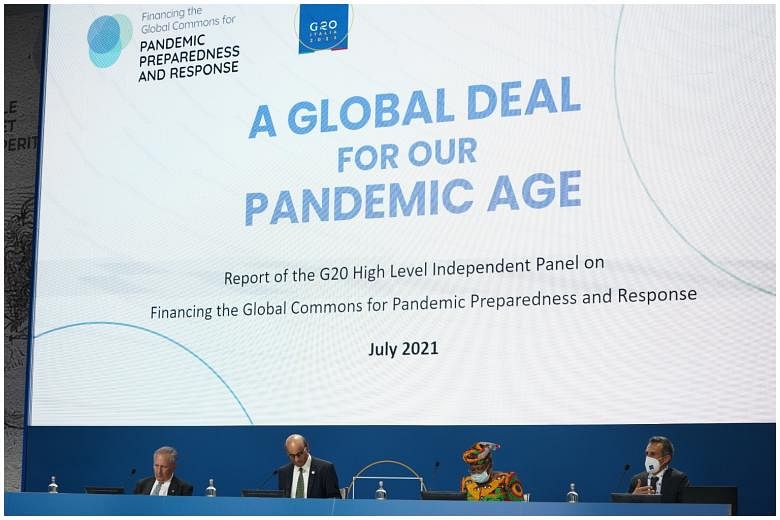SINGAPORE - Future pandemics will be more frequent and deadly, and the world cannot wait for Covid-19 to be over before it makes urgent global investments and reforms.
This needs at least US$75 billion (S$101 billion) over the next five years - more than what the international community has been willing to spend, but negligible compared with the costs of another major pandemic - a committee of leading global experts told leaders of the world's largest economies gathered in Venice on Friday (July 9).
The Group of 20 (G-20) panel, co-chaired by Senior Minister and Coordinating Minister for Social Policies Tharman Shanmugaratnam, among others, said pandemics will cost governments 700 times what it is proposing in yearly additional international investments.
It recommended setting up a US$10 billion annual Global Health Threats Fund, and another US$5 billion each year to shore up international institutions such as the World Health Organisation (WHO) and the World Bank's International Development Association.
The 21-member panel - whose other co-chairs are World Trade Organisation director-general Ngozi Okonjo-Iweala and former United States Treasury Secretary Lawrence Summers - also called for a global board to be created to provide more resources, oversight and coordination.
Achieving safety from pandemics requires a basic shift in thinking about international cooperation, said Mr Tharman, who was in Venice, Italy, to present the report at the G-20 Finance Ministers and Central Bank Governors Meeting with his two co-chairs.
"This is fundamentally not about aid, but collective investments in global public goods from which all nations benefit. It is the ultimate case for both national self-interest and international solidarity at the same time."
Mr Summers called the economic case for additional investments in pandemic preparedness "overwhelming".
"The world is paying many times more and suffering far more human and economic costs from Covid-19 because too little investment in pandemic preparedness was made," he said.
"We must do better going forward to prepare for emerging pandemic threats and reduce the damage wrought. No less than our future global and national security is at stake."
The panel urged all countries to prioritise and sustain domestic investments in pandemic preparedness. Low- and middle-income countries, it said, will need to add about 1 per cent of gross domestic product (GDP) to public spending on health over the next five years.
It also laid out four areas for global action: Secure a fundamental shift towards greater multilateral financing for global health security, including a reformed and strengthened WHO; make global public goods, especially for pandemic security and climate action, part of the core mandate of international financial institutions; establish a Global Health Threats Fund to close gaps in preparedness; and strengthen global governance for pandemic security through a Global Health Threats Board.
The new board will bring together health and finance ministers from a G-20-Plus group of nations and regional organisations. It will also determine the priorities for the new fund, the panel said.
"The world is nowhere near the end of the Covid-19 pandemic. We must move aggressively and immediately to accelerate global access to vaccines, tests, treatments and other supplies to end this deadly crisis as soon as possible, while simultaneously scaling up efforts now to thwart the growing risk of future pandemics - which represent a clear and present danger," said Dr Okonjo-Iweala.
G-20 ministers meet regularly to discuss global policy on trade, health, climate and other issues. They will consider details of the panel's report and recommendations ahead of a joint meeting of finance and health ministers in October.


